疑问句句型详解
- 格式:docx
- 大小:22.37 KB
- 文档页数:4
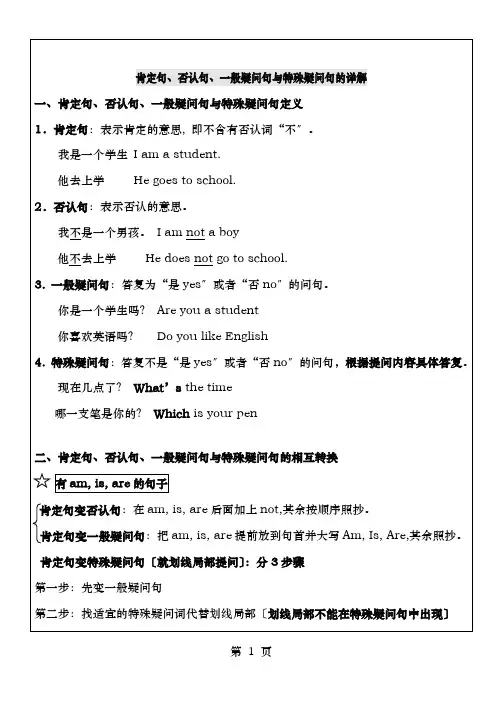
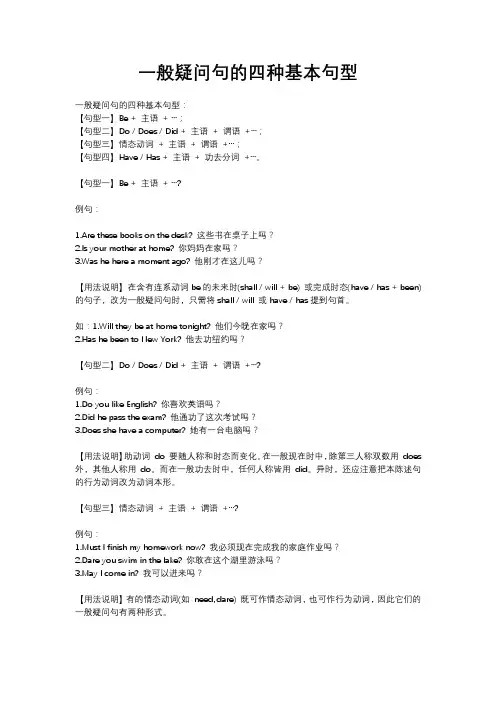
一般疑问句的四种基本句型一般疑问句的四种基本句型:【句型一】Be + 主语+ …;【句型二】Do / Does / Did + 主语+ 谓语+…;【句型三】情态动词+ 主语+ 谓语+…;【句型四】Have / Has + 主语+ 功去分词+…。
【句型一】Be + 主语+ …?例句:1.Are these books on the desk? 这些书在桌子上吗?2.Is your mother at home? 你妈妈在家吗?3.Was he here a moment ago? 他刚才在这儿吗?【用法说明】在含有连系动词be的未来时(shall / will + be) 或完成时态(have / has + been) 的句子,改为一般疑问句时,只需将shall / will 或have / has提到句首。
如:1.Will they be at home tonight? 他们今晚在家吗?2.Has he been to New York? 他去功纽约吗?【句型二】Do / Does / Did + 主语+ 谓语+…?例句:1.Do you like English? 你喜欢英语吗?2.Did he pass the exam? 他通功了这次考试吗?3.Does she have a computer? 她有一台电脑吗?【用法说明】助动词do 要随人称和时态而变化。
在一般现在时中,除第三人称双数用does 外,其他人称用do。
而在一般功去时中,任何人称皆用did。
异时,还应注意把本陈述句的行为动词改为动词本形。
【句型三】情态动词+ 主语+ 谓语+…?例句:1.Must I finish my homework now? 我必须现在完成我的家庭作业吗?2.Dare you swim in the lake? 你敢在这个湖里游泳吗?3.May I come in? 我可以进来吗?【用法说明】有的情态动词(如need, dare) 既可作情态动词,也可作行为动词,因此它们的一般疑问句有两种形式。
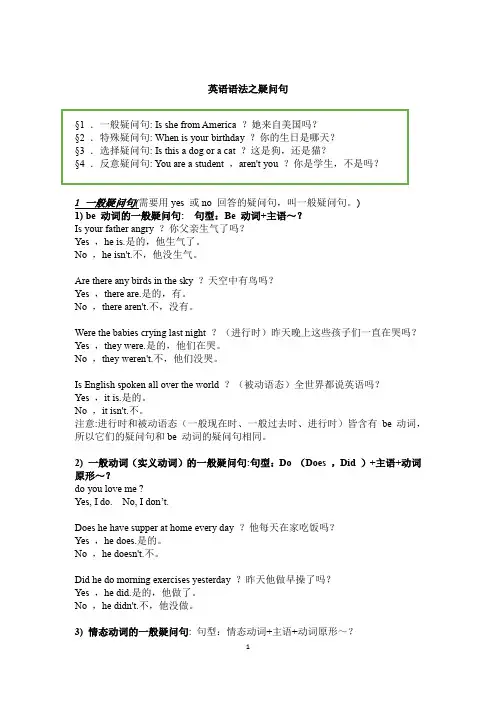
英语语法之疑问句§1 .一般疑问句: Is she from America ?她来自美国吗?§2 .特殊疑问句: When is your birthday ?你的生日是哪天?§3 .选择疑问句: Is this a dog or a cat ?这是狗,还是猫?§4 .反意疑问句: You are a student ,aren't you ?你是学生,不是吗?1 一般疑问句(需要用yes 或no 回答的疑问句,叫一般疑问句。
)1) be 动词的一般疑问句: 句型:Be 动词+主语~?Is your father angry ?你父亲生气了吗?Yes ,he is.是的,他生气了。
No ,he isn't.不,他没生气。
Are there any birds in the sky ?天空中有鸟吗?Yes ,there are.是的,有。
No ,there aren't.不,没有。
Were the babies crying last night ?(进行时)昨天晚上这些孩子们一直在哭吗?Yes ,they were.是的,他们在哭。
No ,they weren't.不,他们没哭。
Is English spoken all over the world ?(被动语态)全世界都说英语吗?Yes ,it is.是的。
No ,it isn't.不。
注意:进行时和被动语态(一般现在时、一般过去时、进行时)皆含有be动词,所以它们的疑问句和be 动词的疑问句相同。
2) 一般动词(实义动词)的一般疑问句:句型:Do (Does ,Did )+主语+动词原形~?do you love me ?Yes, I do. No, I don’t.Does he have supper at home every day ?他每天在家吃饭吗?Yes ,he does.是的。
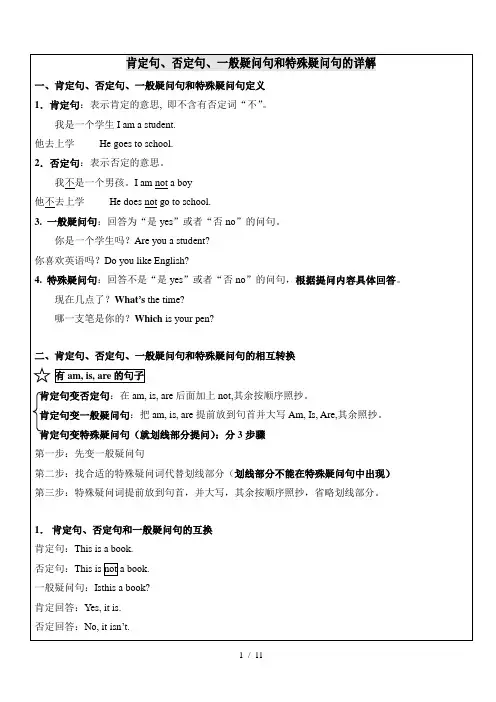
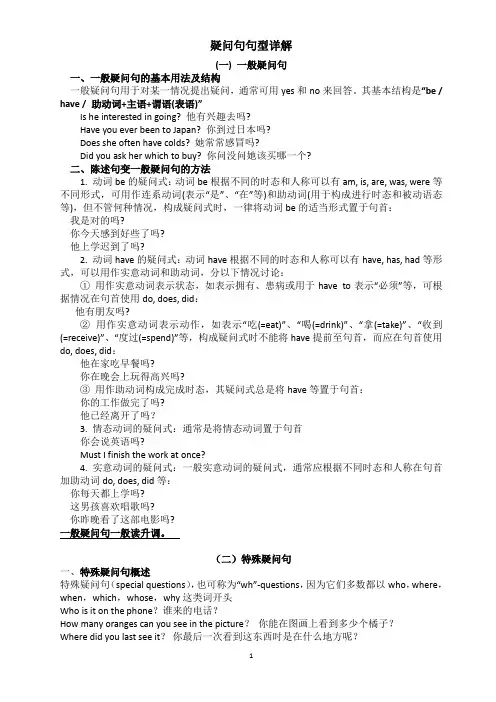
疑问句句型详解(一) 一般疑问句一、一般疑问句的基本用法及结构一般疑问句用于对某一情况提出疑问,通常可用yes和no来回答。
其基本结构是“be / have / 助动词+主语+谓语(表语)”Is he interested in going? 他有兴趣去吗?Have you ever been to Japan? 你到过日本吗?Does she often have colds? 她常常感冒吗?Did you ask her which to buy? 你问没问她该买哪一个?二、陈述句变一般疑问句的方法1. 动词be的疑问式:动词be根据不同的时态和人称可以有am, is, are, was, were等不同形式,可用作连系动词(表示“是”、“在”等)和助动词(用于构成进行时态和被动语态等),但不管何种情况,构成疑问式时,一律将动词be的适当形式置于句首:我是对的吗?_______________________________你今天感到好些了吗?_______________________________他上学迟到了吗?_______________________________2. 动词have的疑问式:动词have根据不同的时态和人称可以有have, has, had等形式,可以用作实意动词和助动词,分以下情况讨论:①用作实意动词表示状态,如表示拥有、患病或用于have to表示“必须”等,可根据情况在句首使用do, does, did:他有朋友吗?_______________________________②用作实意动词表示动作,如表示“吃(=eat)”、“喝(=drink)”、“拿(=take)”、“收到(=receive)”、“度过(=spend)”等,构成疑问式时不能将have提前至句首,而应在句首使用do, does, did:他在家吃早餐吗?_______________________________你在晚会上玩得高兴吗?_______________________________③用作助动词构成完成时态,其疑问式总是将have等置于句首:你的工作做完了吗?_______________________________他已经离开了吗?_______________________________3. 情态动词的疑问式:通常是将情态动词置于句首你会说英语吗?_______________________________Must I finish the work at once? _______________________________4. 实意动词的疑问式:一般实意动词的疑问式,通常应根据不同时态和人称在句首加助动词do, does, did等:你每天都上学吗?_______________________________这男孩喜欢唱歌吗?_______________________________你昨晚看了这部电影吗?_______________________________一般疑问句一般读升调。
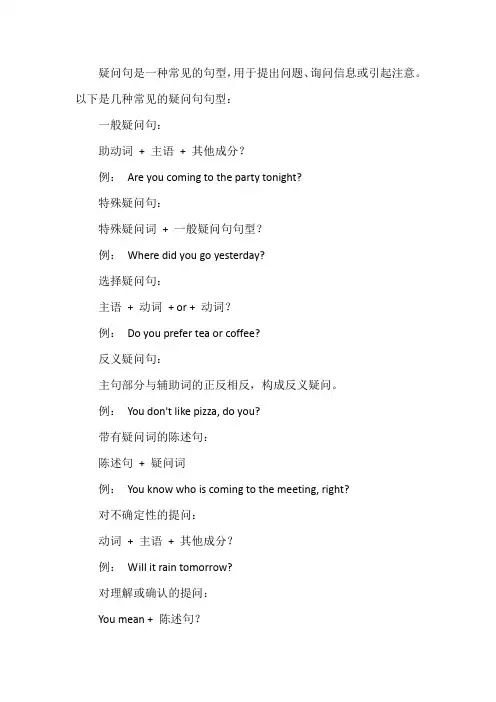
疑问句是一种常见的句型,用于提出问题、询问信息或引起注意。
以下是几种常见的疑问句句型:
一般疑问句:
助动词+ 主语+ 其他成分?
例:Are you coming to the party tonight?
特殊疑问句:
特殊疑问词+ 一般疑问句句型?
例:Where did you go yesterday?
选择疑问句:
主语+ 动词+ or + 动词?
例:Do you prefer tea or coffee?
反义疑问句:
主句部分与辅助词的正反相反,构成反义疑问。
例:You don't like pizza, do you?
带有疑问词的陈述句:
陈述句+ 疑问词
例:You know who is coming to the meeting, right?
对不确定性的提问:
动词+ 主语+ 其他成分?
例:Will it rain tomorrow?
对理解或确认的提问:
You mean + 陈述句?
例:You mean we need to be there by 9 AM?
询问方式或方法:
How + 动词/形容词+ 主语?
例:How does she study for exams?
这些疑问句句型可以根据需要进行灵活运用,使语言更加生动有趣,同时也更准确地表达出提问者的意图。
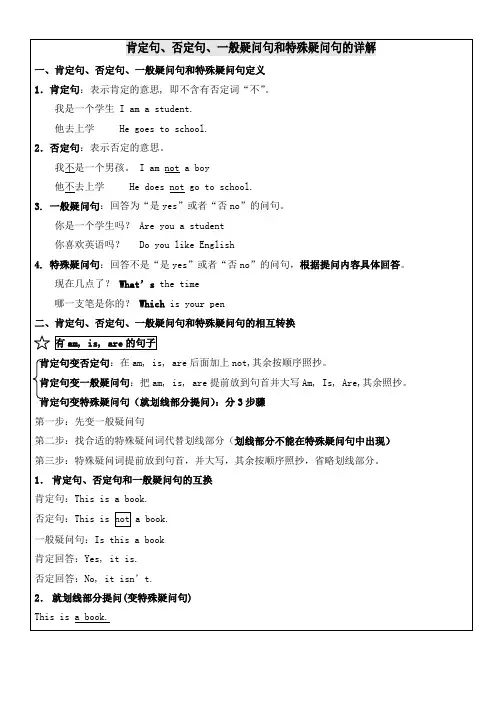
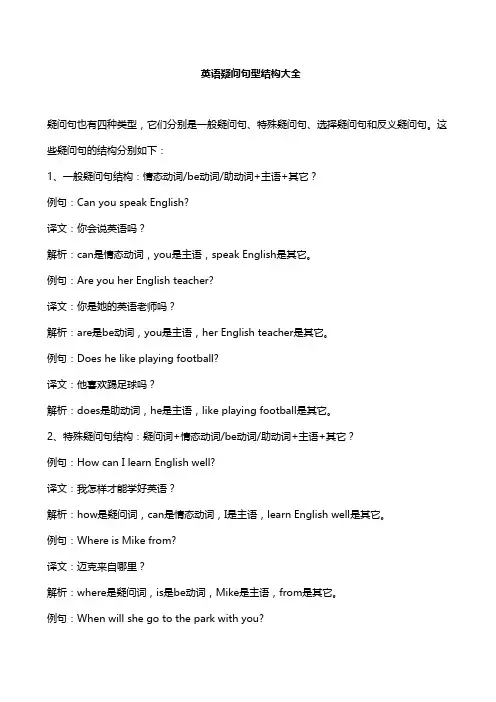
英语疑问句型结构大全疑问句也有四种类型,它们分别是一般疑问句、特殊疑问句、选择疑问句和反义疑问句。
这些疑问句的结构分别如下:1、一般疑问句结构:情态动词/be动词/助动词+主语+其它?例句:Can you speak English?译文:你会说英语吗?解析:can是情态动词,you是主语,speak English是其它。
例句:Are you her English teacher?译文:你是她的英语老师吗?解析:are是be动词,you是主语,her English teacher是其它。
例句:Does he like playing football?译文:他喜欢踢足球吗?解析:does是助动词,he是主语,like playing football是其它。
2、特殊疑问句结构:疑问词+情态动词/be动词/助动词+主语+其它?例句:How can I learn English well?译文:我怎样才能学好英语?解析:how是疑问词,can是情态动词,I是主语,learn English well是其它。
例句:Where is Mike from?译文:迈克来自哪里?解析:where是疑问词,is是be动词,Mike是主语,from是其它。
例句:When will she go to the park with you?译文:她什么时候要和你去公园?解析:when是疑问词,will是助动词,she是主语,go to the park with you是其它。
3、选择疑问句结构:一般疑问句/特殊疑问句+选项A+or+选项B?例句:Is she a teacher or a student?译文:她是一名老师还是一名学生?解析:结构为一般疑问句+两个选项。
例句:Which pen do you want to buy, the blue one or the red one?译文:你想买哪支钢笔,蓝色的还是红色的?解析:结构为特殊疑问句+两个选项。
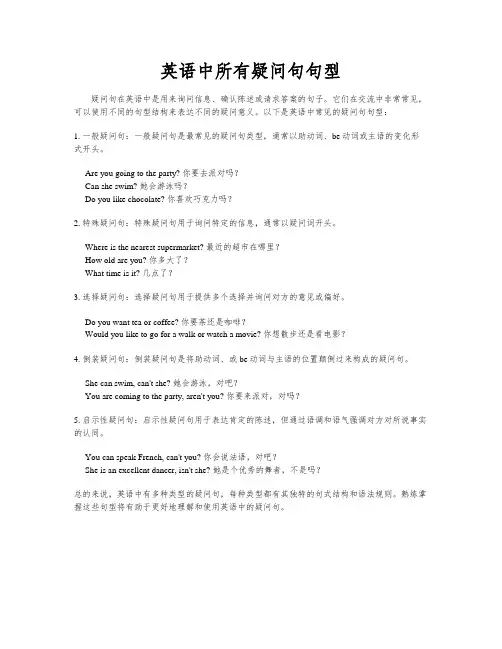
英语中所有疑问句句型疑问句在英语中是用来询问信息、确认陈述或请求答案的句子。
它们在交流中非常常见,可以使用不同的句型结构来表达不同的疑问意义。
以下是英语中常见的疑问句句型:1. 一般疑问句:一般疑问句是最常见的疑问句类型,通常以助动词、be动词或主语的变化形式开头。
- Are you going to the party? 你要去派对吗?- Can she swim? 她会游泳吗?- Do you like chocolate? 你喜欢巧克力吗?2. 特殊疑问句:特殊疑问句用于询问特定的信息,通常以疑问词开头。
- Where is the nearest supermarket? 最近的超市在哪里?- How old are you? 你多大了?- What time is it? 几点了?3. 选择疑问句:选择疑问句用于提供多个选择并询问对方的意见或偏好。
- Do you want tea or coffee? 你要茶还是咖啡?- Would you like to go for a walk or watch a movie? 你想散步还是看电影?4. 倒装疑问句:倒装疑问句是将助动词、或be动词与主语的位置颠倒过来构成的疑问句。
- She can swim, can't she? 她会游泳,对吧?- You are coming to the party, aren't you? 你要来派对,对吗?5. 启示性疑问句:启示性疑问句用于表达肯定的陈述,但通过语调和语气强调对方对所说事实的认同。
- You can speak French, can't you? 你会说法语,对吧?- She is an excellent dancer, isn't she? 她是个优秀的舞者,不是吗?总的来说,英语中有多种类型的疑问句,每种类型都有其独特的句式结构和语法规则。
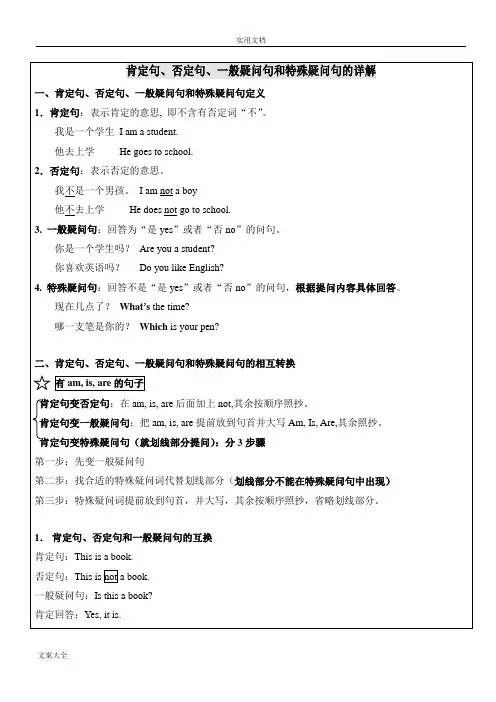
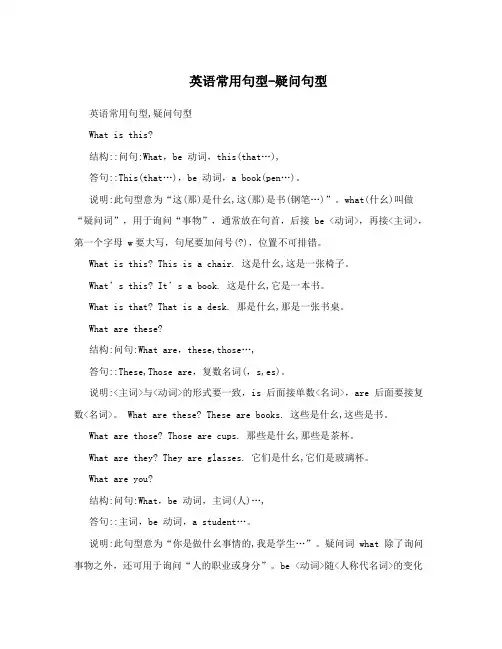
英语常用句型-疑问句型英语常用句型,疑问句型What is this?结构::问句:What,be 动词,this(that…),答句::This(that…),be 动词,a book(pen…)。
说明:此句型意为“这(那)是什幺,这(那)是书(钢笔…)”。
what(什幺)叫做“疑问词”,用于询问“事物”,通常放在句首,后接 be <动词>,再接<主词>,第一个字母 w要大写,句尾要加问号(?),位置不可排错。
What is this? This is a chair. 这是什幺,这是一张椅子。
What’s this? It’s a book. 这是什幺,它是一本书。
What is that? That is a desk. 那是什幺,那是一张书桌。
What are these?结构:问句:What are,these,those…,答句::These,Those are,复数名词(,s,es)。
说明:<主词>与<动词>的形式要一致,is 后面接单数<名词>,are 后面要接复数<名词>。
What are these? These are books. 这些是什幺,这些是书。
What are those? Those are cups. 那些是什幺,那些是茶杯。
What are they? They are glasses. 它们是什幺,它们是玻璃杯。
What are you?结构:问句:What,be 动词,主词(人)…,答句::主词,be 动词,a student…。
说明:此句型意为“你是做什幺事情的,我是学生…”。
疑问词 what 除了询问事物之外,还可用于询问“人的职业或身分”。
be <动词>随<人称代名词>的变化而改变形态,如:I am,we are,you are,he is…。
What are you? I am a student. 你是做什幺事情的,我是一名学生。
英语常用句型-疑问句型What is this结构︰︰问句:What+be 动词+this(that…)?答句::This(that…)+be 动词+a book(pen…)。
说明︰此句型意为“这(那)是什幺?这(那)是书(钢笔…)”。
what (什幺)叫做“疑问词”,用于询问“事物”,通常放在句首,后接 be <动词>,再接<主词>,第一个字母 w要大写,句尾要加问号(),位置不可排错。
What is this This is a chair. 这是什幺?这是一张椅子。
What’s this It’s a book. 这是什幺?它是一本书。
What is that That is a desk. 那是什幺?那是一张书桌。
What are these结构︰问句:What are+these/those…?答句::These/Those are+复数名词(+s/es)。
说明︰<主词>与<动词>的形式要一致,is 后面接单数<名词>,are 后面要接复数<名词>。
What are these These are books. 这些是什幺?这些是书。
What are those Those are cups. 那些是什幺?那些是茶杯。
What are they They are glasses. 它们是什幺?它们是玻璃杯。
What are you结构︰问句:What+be 动词+主词(人)…?答句::主词+be 动词+a student…。
说明︰此句型意为“你是做什幺事情的?我是学生…”。
疑问词 what 除了询问事物之外,还可用于询问“人的职业或身分”。
be <动词>随<人称代名词>的变化而改变形态,如:I am,we are,you are,he is…。
What are you I am a student. 你是做什幺事情的?我是一名学生。
疑问句的句型结构与常见疑问词疑问句是用来提问的一种句子形式,用于获取特定信息或表达疑惑。
在英语语法中,疑问句通常由特定的句型结构和常见的疑问词构成。
本文将就疑问句的句型结构和常见疑问词进行详细介绍,帮助读者更好地理解和运用。
一、疑问句的句型结构1. 一般疑问句一般疑问句是最基本的疑问句形式,由助动词、系动词或情态动词位于主语之前构成。
若句子中已有助动词、系动词或情态动词,则直接将其移至主语之前即可。
例如:- Are you coming to the party?(你要来参加聚会吗?)- Will she go to the concert?(她会去听音乐会吗?)- Did they finish their homework?(他们完成作业了吗?)2. 选择疑问句选择疑问句是用来提问两个或更多的选择时使用的疑问句形式。
一般由“or”连接两个或多个可选择的部分,其中每个部分都是一个陈述句。
例如:- Do you want tea or coffee?(你想要茶还是咖啡?)- Is it raining or snowing outside?(外面是在下雨还是下雪?)3. 特殊疑问句特殊疑问句用于询问特定的信息,通常以疑问词引导。
疑问词有what(什么)、who(谁)、where(哪里)、when(何时)、why (为什么)、how(如何)等。
例如:- What is your favorite color?(你最喜欢的颜色是什么?)- Where did you go on vacation?(你去哪里度假了?)- When will the concert start?(音乐会什么时候开始?)- Why are you late for the meeting?(你为什么迟到开会?)- How did you solve the problem?(你是如何解决这个问题的?)二、常见疑问词的用法和例句1. What(什么)What用于询问事物、特征、职业等。
英语疑问句的类型及用法
英语疑问句的类型主要有以下几种:
1.一般疑问句:以助动词、be动词、情态动词或动词的否定形式开头,对
句子中的某个部分提出疑问。
例如:Is she a doctor? (她是一名医生吗?)
2.特殊疑问句:以特殊疑问词开头,对句子中的某个特定部分进行提问。
常见的特殊疑问词包括what、when、where、why、how等。
例如:What time does the train arrive? (火车什么时候到达?)
3.选择疑问句:在两个或多个选项之间进行选择,通常以“or”连接。
例如:Do you want coffee or tea? (你想喝咖啡还是茶?)
4.反义疑问句:前半句陈述一个事实或观点,后半句用否定形式提出疑
问。
例如:She likes apples, doesn't she? (她喜欢苹果,不是吗?)
不同类型的疑问句在用法上有不同的特点和语境,具体使用需要根据实际情况来选择。
疑问句英语的句型结构一、一般疑问句:能够用yes 或者no 来回答的句子为一般疑问句,比如:“这是你的.....吗?”“你做了.....吗?”句子为一般疑问句。
一般疑问句的结构有几种如:含有be动词的一般疑问句,含有情态动词的一般疑问句,含有have的一般疑问句等,这里只讲含有be 动词的一般疑问句,其它结构后续学到在补充的含有be动词的一般疑问句:把be动词提至句首,首字母大写,句末加问号,朗读时用升调。
be动词+ 主语+ 其它部分?例如:1.陈述句:This is my handbag. 对手提包提问变为一般疑问句一般疑问句:Is this your handbag ? 这是你的手提包吗?回答:Yes,it is (my handbag). 或者No,it isn't (my handbag). 括号内可忽略不写2.陈述句:This is my pen. 对钢笔进行提问一般疑问句:Is this your pen ? 这是你的钢笔吗?回答:Yes,it is. 或No,it isn't.3.陈述句:They are in the classroom.一般疑问句:Are they in the classroom ?回答:Yes,they are. 或No, they aren't.三、选择疑问句一般提出两种或两种以上的可能,让对方从中作出选择的疑问句,选项之间要用连词or 连接,or 前读升调,后面选项读降调例如:1.Are you a doctor or a nurse ? 你是一位医生还是护士?(选择疑问句)回答:I'm a doctor. 或I'm not a nurse.2.Are you Chinese or English? 你是中国人还是英国人?回到:I'm Chinese. I'm not English.3. Is this your house or his house? 这是你的房子还是他的房子?回答:This is my house. 或This isn't his house.四、特殊疑问句英语中特殊疑问词引导(做开头)的问句称为特殊疑问句,读时用降调。
英语常用句型-疑问句型What is this?结构︰︰问句:What+be 动词+this(that…)?答句::This(that…)+be 动词+a book(pen…)。
说明︰此句型意为“这(那)是什幺?这(那)是书(钢笔…)”。
what(什幺)叫做“疑问词”,用于询问“事物”,通常放在句首,后接be <动词>,再接<主词>,第一个字母w要大写,句尾要加问号(?),位置不可排错。
What is this? This is a chair. 这是什幺?这是一张椅子。
What’s this? It’s a book. 这是什幺?它是一本书。
What is that? That is a desk. 那是什幺?那是一张书桌。
What are these?结构︰问句:What are+these/those…?答句::These/Those are+复数名词(+s/es)。
说明︰<主词>与<动词>的形式要一致,is 后面接单数<名词>,are 后面要接复数<名词>。
What are these? These are books. 这些是什幺?这些是书。
What are those? Those are cups. 那些是什幺?那些是茶杯。
What are they? They are glasses. 它们是什幺?它们是玻璃杯。
What are you?结构︰问句:What+be 动词+主词(人)…?答句::主词+be 动词+a student…。
说明︰此句型意为“你是做什幺事情的?我是学生…”。
疑问词what 除了询问事物之外,还可用于询问“人的职业或身分”。
be <动词>随<人称代名词>的变化而改变形态,如:I am,we are,you are,he is…。
What are you? I am a student. 你是做什幺事情的?我是一名学生。
疑问句句型详解(一) 一般疑问句一、一般疑问句的基本用法及结构一般疑问句用于对某一情况提出疑问,通常可用yes和no来回答。
其基本结构是“be / have / 助动词+主语+谓语(表语)”Is he interested in going? 他有兴趣去吗?Have you ever been to Japan? 你到过日本吗?Does she often have colds? 她常常感冒吗?Did you ask her which to buy? 你问没问她该买哪一个?二、陈述句变一般疑问句的方法1. 动词be的疑问式:动词be根据不同的时态和人称可以有am, is, are, was, were等不同形式,可用作连系动词(表示“是”、“在”等)和助动词(用于构成进行时态和被动语态等),但不管何种情况,构成疑问式时,一律将动词be的适当形式置于句首:我是对的吗?_______________________________你今天感到好些了吗?_______________________________他上学迟到了吗?_______________________________2. 动词have的疑问式:动词have根据不同的时态和人称可以有have, has, had等形式,可以用作实意动词和助动词,分以下情况讨论:①用作实意动词表示状态,如表示拥有、患病或用于have to表示“必须”等,可根据情况在句首使用do, does, did:他有朋友吗?_______________________________②用作实意动词表示动作,如表示“吃(=eat)”、“喝(=drink)”、“拿(=take)”、“收到(=receive)”、“度过(=spend)”等,构成疑问式时不能将have提前至句首,而应在句首使用do, does, did:他在家吃早餐吗?_______________________________你在晚会上玩得高兴吗?_______________________________③用作助动词构成完成时态,其疑问式总是将have等置于句首:你的工作做完了吗?_______________________________他已经离开了吗?_______________________________3. 情态动词的疑问式:通常是将情态动词置于句首你会说英语吗?_______________________________Must I finish the work at once? _______________________________4. 实意动词的疑问式:一般实意动词的疑问式,通常应根据不同时态和人称在句首加助动词do, does, did等:你每天都上学吗?_______________________________这男孩喜欢唱歌吗?_______________________________你昨晚看了这部电影吗?_______________________________一般疑问句一般读升调。
(二)特殊疑问句一、特殊疑问句概述特殊疑问句(special questions),也可称为“wh”-questions,因为它们多数都以who,where,when,which,whose,why这类词开头Who is it on the phone?谁来的电话?How many oranges can you see in the picture?你能在图画上看到多少个橘子?Where did you last see it?你最后一次看到这东西时是在什么地方呢?How do you usually go to school?你通常是怎么去学校的呢?二、特殊疑问句的构成及用法(1)它的结构一般为:特殊疑问词+一般疑问句,即:特殊疑问词+be/助动词/情态动词+主语+谓语/表语+(其他),如:谁愿意来踢足球呀?_______________________________你说什么?_______________________________你为什么没有告诉我?_______________________________(2)特殊疑问句有时可有一个以上的疑问词,如:你们何时在何地相遇的?_______________________________(3)特殊疑问句有时须以介词开首,如:By whom is the book written?此书是谁写的?Since when have you lived here?你从什么时候起住在这里的?(4)疑问词作主语或主语的定语时,与陈述句的语序相同谁在房间里唱歌?_______________________________谁的单车坏了?_______________________________三、常见的特殊疑问词/短语who谁,作主语, 用来指人Whom谁,作宾语,用来指人Whose谁的,用来指所属关系Which哪个,哪些,用来指对人或物在一定范围之内进行选择What通常指物when何时,询问时间Where何地,询问地点Why为什么,询问原因How如何,询问手段、方式、工具以及程度等How old多大,询问年龄How much/many多少,询问数量How far多远,询问距离How long多长、多久,询问时间的长度或距离How often多长时间一次,询问频率How soon多久,询问时间你多长时间去看你的祖父母一次?_______________________________你在北京要待多久?_______________________________你有多少朋友?_______________________________你的弟弟多大了?_______________________________你通常怎样去学校?_______________________________你为什么迟到?_______________________________她什么时候回来?_______________________________哪个女孩子会参加校运会?_______________________________这是谁的书?_______________________________树下的那个女孩是谁?_______________________________从你家到学校有多远?_______________________________你多久回来?_______________________________四、特殊疑问句的答语在回答时,可以用一个词或词组,也可以用一个较为完整的句子。
Who has borrowed my bike?谁借了我的自行车?___________________________________.When did he borrow my bike?他什么时候借了我的自行车?____________________________________Where is he?他现在在何处?____________________________________What is he doing there?他在那儿干什么呢?____________________________________Whose bike is this?这辆自行车是谁的?____________________________________特殊疑问句一般读降调。
(三)选择疑问句选择疑问句的结构1. 英语中的选择疑问句结构很简单,就是先把一般疑问句结构写出,然后在其后加上“or + 选择部分”即可,当然其标点也是问号。
Are you a student? (一般疑问句)你是个学生吗?变成:(选择疑问句)你是学生还是老师?_______________________________你喜欢踢足球还是打篮球?_______________________________你会说英语还是汉语?_______________________________2. 选择疑问句的回答不同于一般疑问句,不能用yes/no来回答而必须选择选项进行回答Have you ever been to Beijing or Shanghai?(I‘ve been to) Shanghai.选择疑问句前面的选择部分用升调,句末用降调。
(四)反义疑问句一、反义疑问句(The Disjunctive Question)即附加疑问句。
它表示提问人的看法,没有把握,需要对方证实。
反义疑问句由两部分组成:前一部分是一个陈述句,后一部分是一个简短的疑问句,两部分的人称时态应保持一致。
1.陈述部分肯定式+疑问部分否定式(前肯后否)2.陈述部分否定式+疑问部分肯定式(前否后肯)They work there, ___________?She was ill yesterday, ___________?You didn’t go, ___________?He can’t ride a bike, ___________?二、请注意以下句型的反义疑问句的用法1. 当陈述部分有never,seldom, hardly,few,little,barely, scarcely, nothing 等否定词时,后面的疑问句则表示为:There are few apples in the basket, are there?He can hardly swim, can he?They seldom come late, do they?2.当陈述部分是祈使句时,疑问句要根据语气来表达Let’s go out for a walk, shall we?Let us go our for a walk, will you?Turn on the radio, will you?反意疑问句可读升调或降调,但含义不同。
用升调表示说话人所陈述内容把握不大,希望对方加以证实。
用降调表示说话人对所陈述内容比较有把握,期待对方同意。
You were in my computer class, weren't you?强化练习题:翻译下列疑问句。
1.这个多少钱?______________________2.你喜欢哪种的电影?______________________3.现在几点钟?______________________4.今天星期几?______________________5.你的生日是什么时候?______________________6.你最喜爱的科目是什么?______________________7.你多大了?______________________8.你正在做什么?______________________9.乘飞机到上海需要多长时间?______________________10.你在假期通常都做什么?______________________11.你最喜欢哪一个季节?______________________12.你为什么喜欢篮球?______________________13.他出生于何时何地?______________________14.你很容易习惯新生活吗?______________________15.你喜欢幽默作家吗?______________________16.你空闲时还爱读别的什么类型的故事吗?翻译句子练习1.那位男士可能会选什么颜色的车?____________________________________________________________________________ 2.为何那位女士说那个男士想成为校车司机?____________________________________________________________________________ 3.“Britain Racing Green”看起来怎么样?____________________________________________________________________________ 4.那个男的有几个表兄弟姐妹?____________________________________________________________________________ 5.为什么那个女士不喜欢春节?____________________________________________________________________________ 6.那个男士怎样评价他的亲戚?____________________________________________________________________________ 7.第一次地震后我们要注意些什么?____________________________________________________________________________ 8.什么时候可以跑到外面去?____________________________________________________________________________ 9.地震期间室内我们该待在哪儿?____________________________________________________________________________ 10.你能出多少租金?____________________________________________________________________________ 11.你们什么时候有空去看公寓?____________________________________________________________________________ 12. 你什么时候来接我?。